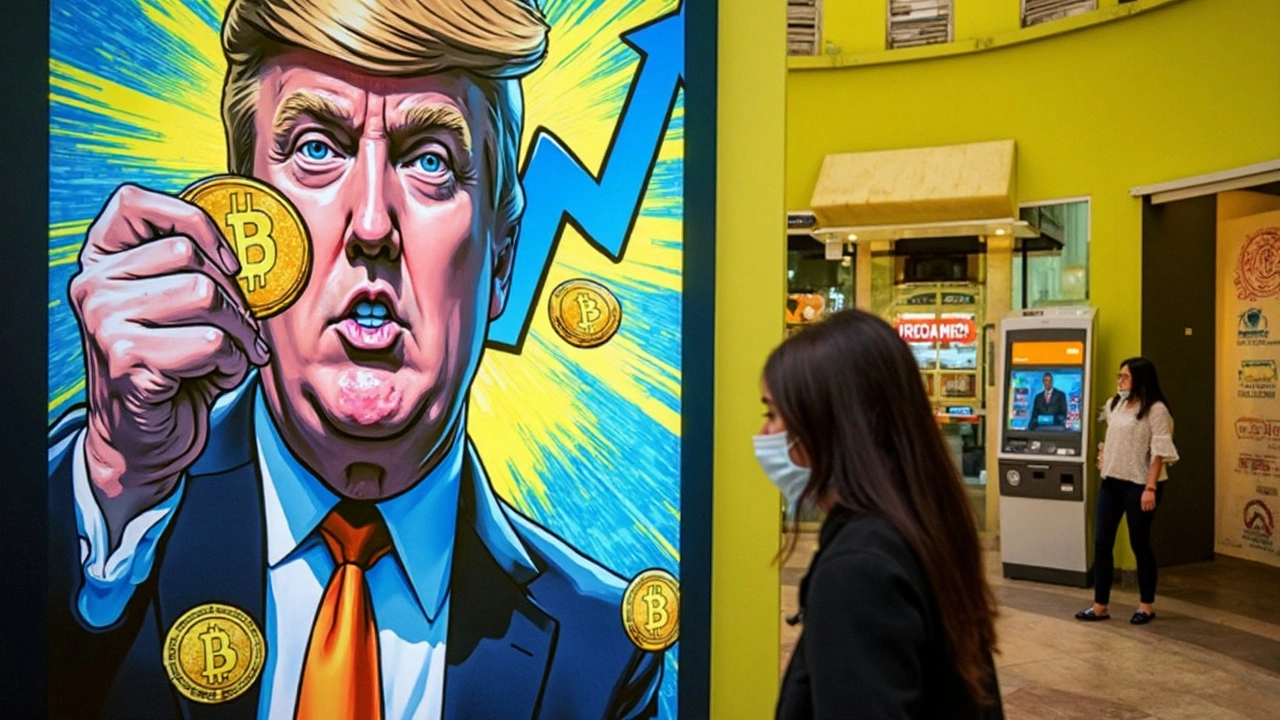Bitcoin Takes a Hit as Trump's New Tariffs Spark Market Tumult

Bitcoin's price saw a tumultuous drop in early April 2025, right on the heels of U.S. President Donald Trump's bombshell announcement about broad-ranging tariffs on trade with 15 different countries, among which are China, Canada, and Mexico. As relations got tense on the global trade front, Bitcoin's value stumbled by nearly 8.5% in a mere day, sliding to a low of $74,500, marking a new cyclical dip. In contrast, traditional markets like the S&P 500 displayed a surprising steadiness amid the storm.
The ramifications of the tariff announcement weren't limited to just cryptocurrency prices; they spilled over into corporate Bitcoin holdings, which saw their value shrink by over $4 billion. ETFs dedicated to tracking these holdings, like Bitwise's OWINB, took a hard hit, plummeting more than 13%. This major sell-off reflected rising macroeconomic uncertainty. While Bitcoin has long been seen as a separate entity from traditional markets, its growing correlation with risk-on assets, especially tech stocks, seemed to shine through more than ever.
Critical Levels and Prospect of Recovery
Key industry thinkers are watching closely. Charles Edwards, the mind behind Capriole Investments, has spotlighted the $91,000 level as a key resistance marker. If Bitcoin can close above this point on a daily basis, it could potentially reverse the downward trend. However, should the price fall further below $71,000 to $78,000, it might lead to additional negative pressure. Edwards pointed to the Philadelphia Fed's Business Outlook Survey, which dipped below 15, usually a harbinger of economic downturns, adding yet another layer to the complex picture.
Despite the current turbulence, there's no shortage of long-term positivity. Analysts like Zach Pandl from Grayscale express that the tariffs might chip away at the U.S. dollar's grip over the world, paving the way for Bitcoin as a decentralized asset outside sovereign control.

Potential Catalysts for Change
There's buzz around possible regulatory changes under Trump's administration, including whispers about setting up a Bitcoin Strategic Reserve and the introduction of the 'Bitcoin Act of 2025.' These potential shifts are thought to be drivers that could turbocharge institutional adoption of Bitcoin. However, questions linger regarding Bitcoin's viability within corporate treasuries, given its infamous volatility and the ever-present specter of regulatory challenges.
Another potential game-changer is the Federal Reserve. If it leans towards another round of quantitative easing, coupled with a growing M2 money supply, it might set the stage for another Bitcoin price rally due to enhanced liquidity. Yet, timing this is anyone's guess.
With economic uncertainties reaching levels we haven't felt since 2000, 2008, and even 2022, the atmosphere is fraught with tension. Traders are gearing up to weather ongoing volatility as the world digests the ripple effects of the new trade policies.
Honestly, the tariff shock shows how interconected everything is these days. When the government slaps on new duties, even the crypto world feels the tremor. Bitcoin’s dip is just a symptom of broader risk aversion across markets. That said, the resilience we’ve seen in the S&P hints that not every asset class is moving in lockstep. It’s a good reminder to keep a diversified basket and stay open to different perspectives.
The whole thing is a staged distraction, a calculated move by the deep‑state to keep the masses scared! They want us to believe that tariffs will cripple crypto, but they’re secretly funneling liquidity into shadow wallets to buy the dip. Every dip is a setup for a massive pump that only the insiders know about! Wake up, folks, the narrative is being controlled from the top, and the “steady” S&P is just a smokescreen.
Liquidity crunch, macro decoupling, systemic risk vectors converge. Bitcoin exhibits beta correlation with risk‑on equities under stress. Price action reflects realignment of asset allocation hierarchies. Market participants recalibrate exposure matrices accordingly.
The previous comment contains several grammatical inaccuracies and ambiguous terminology. “Beta correlation” should be specified as the statistical measure of co‑movement. Additionally, “risk‑on equities” is a colloquial phrase that benefits from a clear definition. Clarifying these points will improve the precision of the analysis.
Reading the headline about Trump’s tariffs feels like watching a megaphone amplify the anxieties that have been bubbling under the surface for months. The immediate 8.5% plunge in Bitcoin is not just a number; it is a visceral reminder that even the so‑called “digital gold” cannot hide from macro‑political shockwaves. Investors who once touted crypto as an untouchable hedge now scramble to reassess their risk models, and that scramble is evident in the $4 billion erosion of corporate Bitcoin holdings. While the S&P 500 appears oddly placid, its steadiness is more a testament to institutional cushioning than true market confidence. The narrative that Bitcoin is decoupled from traditional finance dissolves under the pressure of coordinated policy actions, especially when those actions target the very trade channels that feed global liquidity. Moreover, the $91,000 resistance level highlighted by Capriole Investments feels like a distant lighthouse for traders who are navigating through a storm of uncertainty. If Bitcoin can muster a close above that mark, it might signal that the market’s fear is waning, but the path to that level is littered with potential pitfalls. Falling below the $71,000 to $78,000 corridor could trigger automated sell‑offs that further depress sentiment, creating a feedback loop that feeds itself. The underlying sentiment is captured beautifully by the Philadelphia Fed’s survey dipping below the 15‑point threshold, an age‑old harbinger of economic slowdown. On the flip side, analysts like Zach Pandl see a silver lining, arguing that the erosion of dollar dominance could eventually make Bitcoin the go‑to store of value for those seeking sovereignty. The speculative “Bitcoin Strategic Reserve” and the so‑called “Bitcoin Act of 2025” are more than just policy proposals; they are cultural artifacts that reflect a growing appetite for decentralized assets. Yet, the sheer volatility of Bitcoin remains a stumbling block for corporate treasuries that require predictability. Regulatory ambiguity continues to loom like a dark cloud, threatening to stifle the very institutional adoption that could buoy Bitcoin’s price. As for the Fed, another round of quantitative easing would inject liquidity that could serve as a catalyst for a fresh rally, but timing that move is akin to catching a falling knife. In this climate of heightened geopolitical risk, the market’s ability to absorb shocks will be tested like never before. Ultimately, whether Bitcoin emerges as a resilient alternative or collapses under pressure will depend on a confluence of policy, perception, and pure market momentum.
Great synthesis, Christine. To add a technical layer, the recent drop aligns with a contraction in on‑chain activity metrics such as transaction volume and active addresses, which often precede larger price corrections. From a macro perspective, the tariff‑induced risk aversion is also nudging the risk‑adjusted Sharpe ratio of Bitcoin downward, making it less attractive relative to traditional equities for short‑term allocations. However, the long‑term supply‑side dynamics, like the impending halving, continue to underpin a bullish narrative that may re‑assert itself once policy shockwaves subside.
The tariffs increase import costs, reducing global trade volume. Lower trade activity typically slows fiat currency circulation, impacting liquidity. Bitcoin’s price reaction follows the standard risk‑on/risk‑off model under macro stress.
Bitcoin will bounse back soon, trust me!
The recent market movement reflects a predictable outcome of policy‑driven uncertainty. Tariff announcements invariably induce short‑term capital flight from volatile assets, a phenomenon well documented in academic literature. Consequently, Bitcoin’s depreciation aligns with established financial theory, underscoring the necessity for investors to maintain disciplined exposure limits.
Overblown drama about Bitcoin’s dip distracts from real economic pain. The tariffs will hurt manufacturers more than any crypto price swing.
Totally get the frustration, but remember that market cycles are inevitable. Keeping a cool head and a balanced portfolio can turn this dip into a future opportunity. Stay focused and keep learning-you’ve got this.